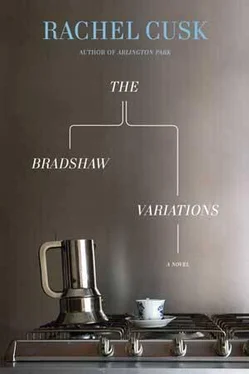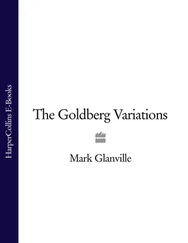‘Do you want anything?’ he says.
She is looking at his things, his antiques and rugs, the books on his shelves. She is filled with strange yearning, as though she has no home of her own, no possession, no place where she belongs.
‘This feels so — permanent,’ she says.
He laughs. ‘I’m too old to be anything except permanent,’ he says.
He has told her that he is amicably separated from his wife, that his children are grown-up, that his work has become increasingly vocational, like that of a priest; and it seems to her now that this is the true accomplishment, this informed solitude, this independence. Is it not sad, then, to be alone? Is it, after all, truer, more honourable? She imagines herself and Thomas, old. She images their lives so entangled that they could never be extricated. It would be horrible to die tangled up with another person, not to know precisely what it was that was dying.
He is standing in front of her. The door to the street is open. She looks at his face but she can only see his eyes. They are so warm, so possessive. They leave no part of her out.
‘How is it possible?’ she says. ‘I feel like I know you.’
It is because he is already formed: there is no entanglement, no blurring of self. She supposes he can be petty, boring, demanding. But it would have nothing to do with her.
‘Tell me what you want,’ he says, touching her face.
She laughs. ‘I want to know the nature of your relationship with Lawrence Metcalf.’
His hands are in her hair. He is kissing her, kissing her throat and mouth, and speaking while he kisses.
‘Lawrence Metcalf is a friend of my cousin,’ he murmurs, against her lips. ‘I thought he was a bore but I was wrong.’
‘Were you?’ she laughs, while he puts his fingers under her jacket and slides it from her shoulders.
‘He is a — what’s the expression? A good bloke. I will always care for him. Always,’ he says, kneeling, unbuttoning her shirt, kissing her navel. Then he stands and goes to shut the door. He picks up her jacket. She watches him fold it carefully and lay it over a chair. He holds out his hand to her. ‘Come upstairs,’ he says.
*
He drives her all the way home. It is past midnight and the roads are empty. His car is clean and fast, expensive. She wonders what she will do. She does not feel anxious. It is his authority, the authority of his age and his decisiveness, of his knowledge and his fast car that allays her anxiety. It is as though he has authority not only over herself but over Thomas too. Just as he has dispensed with the fiddliness of her arrangements, scattered the train timetable to the winds in his fast, efficient car, so the tangle of her bonds and loyalties seems to fall away and dissolve in the darkness of the swiftly running roadside. She feels powerful and calm, sitting beside him. She feels free. But as the familiar outskirts of home appear, she is suddenly riven by thrusts of fear. She feels that he is going to abandon her. He is going to leave her here, stripped of the integrity of her own life, her arrangements all destroyed. Whatever he has dispensed with, he gives no sign that he intends to replace it with something else. He assumes she knew what she was doing, that she did what she meant to do. It is up to her what she does. She realises that she is not powerful after all. The power is his: it has enclosed her for a few hours, as his car now encloses her; it has moved her from one place to another.
He puts out his hand and touches her. The other hand is on the steering wheel. She feels again how formed he is, how complete. But now it is something she is on the outside of. She is shut out, yearning to be let back in.
‘This is difficult,’ he says.
She wonders what he means. Is he referring to a generic difficulty, the difficulty of returning a married woman to her home after a sexual encounter?
‘It’s okay,’ she says, staring through the dark windscreen at the familiar streets. They have stopped at some traffic lights. He is watching her. He is watching her staring at the things she has broken, as an adult watches a child staring at a broken toy. He is sympathetic, but he is not a member of her world.
‘It’s not okay,’ he says. ‘Do you want to go back to my house?’
She shakes her head. But he has made her pain go away. She feels better. She feels powerful again. Only this time, she is suspicious of the feeling.
‘You turn left here,’ she says.
Yes, it is bewildering, unfathomable, to find that love and loss and despair and hope are cellular, partitive; that in the fragment of each the structure of the whole is present, like the specimens scientists examine under microscopes; the whole structure and character of her life present in these moments of terror and elation. How can she love a man she only met a few hours ago? How can she feel abandoned by someone who this morning she didn’t know was alive? Yet she does. Her love and her terror lie beyond her scope, at cell-level. They existed before she herself knew what existence was.
This is what the call of her body has been, the very cells asking for assuagement.
‘It’s just here,’ she says, at the top of Montague Street.
‘I feel that something is wrong,’ Dieter says. He pulls into the darkness at the side of her road.
And she will never afterwards know what exactly he meant, though it will seem to her as though he was in that moment mysteriously gifted with a special insight, with new forms of knowledge; she will never know exactly what he intended to say. She will only marvel at how quickly and glidingly it happened, the fusion of impulses, so that she snatched her phone from her bag and remembered that she had switched it off, hours ago. She thinks of it often afterwards. She thinks of the way she felt during that drive with Dieter, of her realisation that her fate was inscribed in the smallest particles of her being, inextricable; that she would always love and despair and struggle and succeed without knowing quite why she did. She thinks of the passion she experienced with Dieter, a passion of the cells, of the smallest particles. This, she believes, is why no logical explanation can be found for what he said. And it died the instant it was born, this chance of proceeding without logic, without reason, without explanation. For a beautiful, catastrophic moment she glimpsed the possibility of a relationship of pure instinct.
The phone pulses and bleeps, pulses and bleeps, spewing out messages. Thomas has called more than twenty times in four hours. He is at the hospital. Dieter turns the car around and drives her straight there.
Thomas is reading a story by Tolstoy called ‘The Kreutzer Sonata’. It is about a man who is driven by his wife’s piano playing to murder her. It is not clear whether this is entirely the fault of the music. As well as being what it is, the music has a symbolic function in the story. What it symbolises is sexual desire. When the lady plays Beethoven’s Kreutzer Sonata with a dashing gentleman violinist, it is as though they are conducting an affair before the husband’s eyes. He is driven mad with jealousy and murders her most horribly, having chased the violinist away. There should be no music, the man — his name is Pozdnyshev — says. It is too arousing; it facilitates immorality, removing the power of individual thought, as sexual feelings remove the proper inhibitions.
It was the title of the story that attracted Thomas, so he is surprised by its curious message. But there is one part of it that particularly startles him, in which Pozdnyshev argues quite persuasively that love does not exist. Love is only an aspect of sexual desire: like music, it is a culturally sanctioned disguise for the state of arousal. But sexual desire — love — destroys the moral being. When a man loses his virginity, Pozdnyshev says, he should consider himself married for life to that woman — a prostitute, in Pozdnyshev’s own case. Thomas thinks about sixteen-year-old Emily Griffiths, who seemed so cool and composed in the days when he first attracted her attention, and fell dismayingly to pieces a year later, when he ended their relationship. He was going to university, and cheerfully thought it was for the best. But Emily would not accept it. She bellowed and shrieked, like the piano-playing wife when Pozdnyshev stuck his knife in her ribs. Truly, it was as if he were murdering her. And he went off to university a murderer, for Emily never spoke to him again. Perhaps she did consider them to be married for life, so that the life she lived afterwards was a kind of death. When he came home for the holidays, his mother told him that Emily had had a nervous breakdown. She seemed to think it was a good thing Thomas had got rid of her.
Читать дальше












